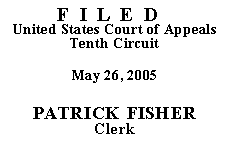

UNITED STATES OF AMERICA,
Before SEYMOUR, LUCERO, and O'BRIEN,
Circuit Judges.
Mr. Lozano-Morales pled guilty to illegal reentry after deportation in
violation of 8 U.S.C. §1326(a)(1), (2), and (b)(2). He filed a motion for a
downward departure based on cultural assimilation, delay in prosecution, and
family ties and responsibilities. The district court denied his motion and
sentenced him at 57 months imprisonment, the bottom of the guideline range.
Mr. Lozano-Morales appealed and we held that (1) he waived his separation of
powers claim by pleading guilty (i.e., his argument that the prosecutor usurped
the district court's sentencing power by delaying his federal prosecution until the
completion of his state sentence, thereby preventing the district court from
sentencing him concurrently), and (2) we lacked jurisdiction to review the district
court's discretionary decision to deny his motion for downward departure on the
ground that his circumstances did not warrant the departure. See United States v.
Lozano-Morales, No. 03-2163, 2004 WL 2677687 (10th Cir. Nov. 24, 2004).
Mr. Lozano-Morales petitioned the Supreme Court for a writ of certiorari, which
was granted. The Court vacated our judgment and remanded the case to us for
further consideration in light of United States v. Booker, 125 S.Ct. 738
(2005).
For the following reasons, we reinstate our prior decision and affirm Mr.
Lozano-Morales' sentence.
As we held in United States v. Sierra-Castillo, our lack of jurisdiction to review a district court's discretionary decision not to depart downward is not impacted by Booker:
Booker excised the statutory provision of the Sentencing Reform Act providing for the standard of review of sentences on appeal, 18 U.S.C. § 3742(e), but left intact the section providing for appellate review of sentences, 18 U.S.C. § 3742(a). See Booker,125 S. Ct. at 765 (noting that § 3742(a) continues to provide for appellate review of Guidelines sentences). Pursuant to § 3742(a), this court therefore continues to have the same jurisdiction to review Guidelines sentences as it had before the Supreme Court's decision in Booker. See Doe, 398 F.3d at 1256; see also United States v. Ruiz-Alonso, 397 F.3d 815, 817 (9th Cir.2005) (applying § 3742(b)).
405 F.3d 932, 936 n.3 (10th Cir. 2005). In other words, Booker notwithstanding, we still lack jurisdiction to review a district court's discretionary decision to deny a motion for a downward departure on the ground that a defendant's circumstances do not warrant the departure. Id. at 936. Moreover, the discretionary decision not to depart downward does not involve judicial fact finding that offends the Sixth Amendment.(1)
Nevertheless, we do review Mr. Lozano-Morales' sentence in light of Booker's remedial holding. Mr. Lozano-Morales did not raise United States v. Blakely, 124 S.Ct. 2531 (2004), or Booker in the district court or in his initial appeal. Thus, we review the district court's mandatory application of the guidelines for plain error. Sierra-Castillo, 405 F.3d at 941. Although Mr. Lozano-Morales was sentenced at the bottom of the guidelines range, he does not satisfy the fourth prong of plain error review because "his sentence is consistent with [the] national norm and there is no record evidence to support a lower sentence." United States v. Gonzalez-Huerth, 403 F.3d 727, 738-39 (10th Cir. 2005).
Accordingly, we REINSTATE our prior decision holding that we lack jurisdiction over the two issues Mr. Lozano-Morales initially raised on appeal. The sentence imposed by the district court remains undisturbed.
Entered by the Court:
Terrence L. O'Brien
United States Circuit Judge
*. This order and judgment is not binding precedent except under the doctrines of law of the case, res judicata and collateral estoppel. The court generally disfavors the citation of orders and judgments; nevertheless, an order and judgment may be cited under the terms and conditions of 10th Cir. R. 36.3.
1. Mr. Lozano-Morales' base offense level was increased by sixteen levels pursuant to USSG § 2L1.2(b)(1)(A)(ii) because he was previously deported after a conviction for a crime of violence. This enhancement does not implicate the Sixth Amendment because the rule announced in Booker specifically excludes from its application the fact of a prior conviction. Booker, 125 S.Ct. at 755-56; Sierra-Castillo, 405 F.3d at 941 (finding non-constitutional Booker error where defendant's base offense level was increased sixteen levels under crime of violence provision of USSG 2L1.2(b)(1)(A)(ii)); United States v. Trujillo-Terrazas, 405 F.3d 814, 817-18 (10th Cir. 2005) (same). See also United States v. Moore, 401 F.3d 1220, 1221 (10th Cir. 2005) (holding Booker does not require the government to charge in the indictment or prove beyond a reasonable doubt either the existence of a prior conviction or its classification as a violent felony under the Armed Career Criminal Act).